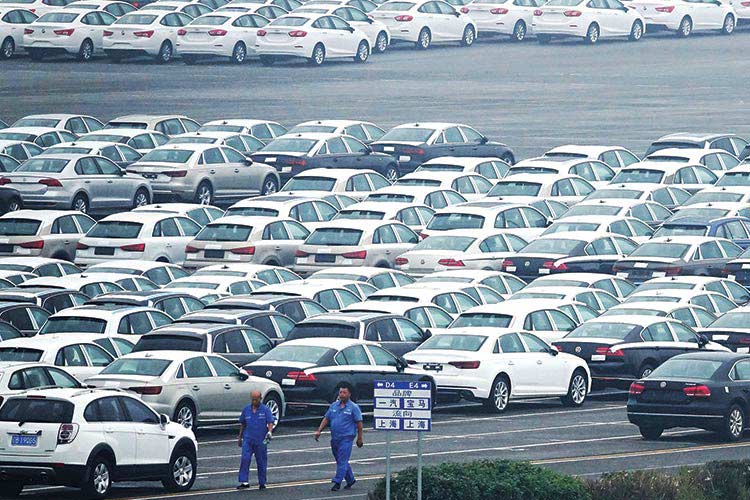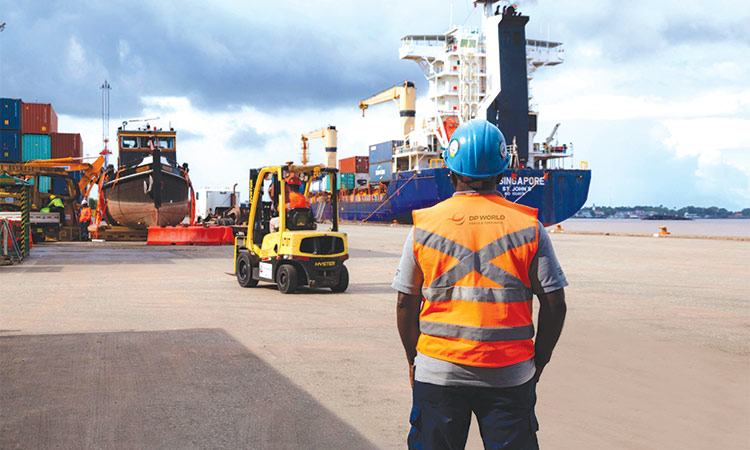China auto sales decline 14 per cent in February

Newly-manufactured cars are seen at the automobile terminal in the port of Dalian, Liaoning province, China. Reuters
The China Association of Automobile Manufacturers (CAAM) said sales fell to 1.48 million vehicles last month, after declines of 16 per cent in January and 13 per cent in December.
Sales of new energy vehicles, such as electric cars, rose 53.6 per cent year-on-year in February, the group said.
“The trend experienced last year has continued into this year, and the economic situation has also been weak.
“This has dragged down consumption,” CAAM’s Deputy Secretary General Shi Jianhua told reporters at a news briefing in Beijing.
“Consumers are also waiting for more government policies,” he said. China plans billions of dollars in tax cuts and infrastructure spending to support an economy growing at its slowest pace in almost 30 years due to softer domestic demand and a trade war with the United States.
It has promised subsidies to boost rural sales of some vehicles as well as demand for new energy vehicles, after China’s auto market contracted last year for the first time in more than two decades.
The major task for dealers in the first half of 2019 is to reduce vehicle inventories amid rising funding pressures, said Chen Shihua, CAAM’s assistant secretary general.
The sales performance for some Chinese automakers has been mixed so far. Great Wall Motor Co Ltd reported 18 per cent growth in February compared to the same month last year, while Geely Automobile Holdings Ltd said sales fell 24 per cent in the same period.
Car sales in January and February tend to be affected by the Lunar New Year holiday — which this year took place in the first week of February − when consumers often delay purchases, auto executives have said.
China’s factory-gate inflation in February stayed flat from a month earlier, while gains in consumer prices slipped to the lowest level in more than a year as muted price pressures point to lacklustre demand in the world’s second-largest economy.
The inflation data is the latest indication of slowing demand in China, as factory surveys also point to dwindling export orders amid a protracted U.S.-Sino trade war.
Signs of deflation could prompt the government to roll out more aggressive measures to halt a sharper slowdown after growth dipped to nearly 30-year lows in 2018.
China’s producer price index (PPI) in February rose 0.1 per cent on year, data from the National Bureau of Statistics (NBS) showed, the slowest pace since September 2016, and compared with a 0.1 per cent increase in January.
Analysts polled by Reuters had expected producer inflation would pick up to 0.2 per cent.
On a monthly basis, producer prices have already been falling over the past four months. In February, PPI fell 0.1 per cent, moderating from a 0.6 per cent decrease in January.
Data showed prices for raw materials dropped 1.5 per cent on year.
Continuously falling producer prices will further eat into profits at many Chinese industrial firms as earnings have been falling in the past few months, putting pressure on investment, consumption and employment.
Data this week showed China’s exports in February tumbled the most in three years and imports fell for a third straight month, heightening fears about a global slowdown.
The government is targeting economic growth of 6.0 to 6.5 per cent in 2019, Premier Li Keqiang said at Tuesday’s opening of the annual meeting of China’s parliament, a lower target than set for 2018.
The consumer price index (CPI) in February rose 1.5 per cent from a year earlier, the slowest since January 2018, and slower than the 1.7 per cent increase in January and below the government target of around 3 per cent this year.
Analysts had expected it to have eased to 1.5 per cent. On a month-on-month basis, the CPI rose 1.0 per cent. The food price index in February rose 0.7 per cent from a year earlier, compared with January’s reading of 1.9 per cent.
The core consumer price index, which strips out volatile food and energy prices, climbed 1.8 per cent on year, easing from January’s 1.9 per cent gain.
Reuters



